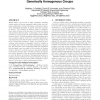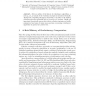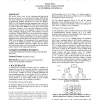219 search results - page 20 / 44 » Optimal control of epidemic evolution |
81
Voted
GECCO
2010
Springer
15 years 2 months ago
2010
Springer
Within nature, the success of many organisms, including certain species of insects, mammals, slime molds, and bacteria, is attributed to their performance of division of labor, wh...
98
Voted
ECAL
1995
Springer
15 years 1 months ago
1995
Springer
After an outline of the history of evolutionary algorithms, a new ( ) variant of the evolution strategies is introduced formally. Though not comprising all degrees of freedom, it i...
GECCO
2007
Springer
15 years 3 months ago
2007
Springer
We review recent work on the Hierarchical-If-And-Only-If problem and present a new hierarchical problem, HIFF-M that does not fit with previous explanations for evolutionary diffi...
GECCO
2010
Springer
15 years 24 days ago
2010
Springer
Understanding the evolution of cooperation as part of an evolutionary stable strategy (ESS) is a difficult problem that has been the focus of much work. The associated costs of co...
GECCO
2009
Springer
15 years 4 months ago
2009
Springer
Embodied cognition emphasizes that intelligent behavior results from the coupled dynamics between an agent’s body, brain and environment. In response to this, several projects h...



